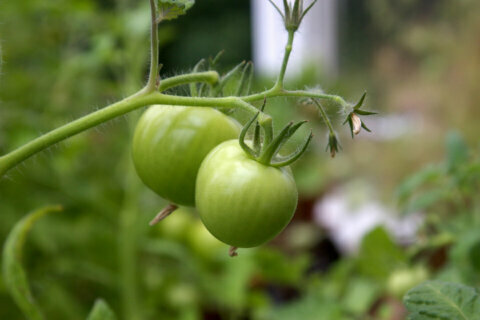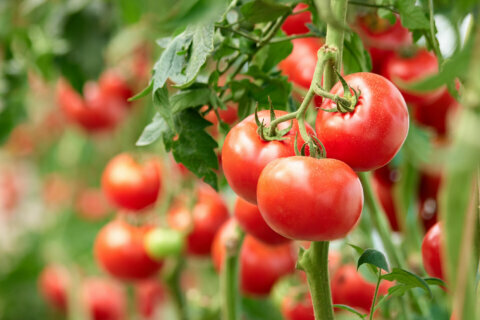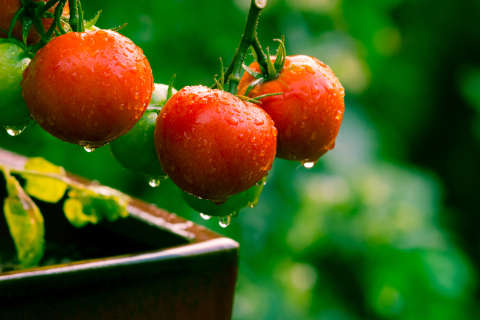Meet Mike in Leesburg next Sunday:
Mike will appear at 11 a.m. and 1:30 p.m. Sunday, April 19, at the Leesburg Flower & Garden Festival.
Then, he’ll be at Greenstreet Gardens in Alexandria and Lothian on Saturday and Sunday, April 25 and 26. Find event information here.
Lawns: You can’t seed & weed and feed
Kathy in Bethesda writes: “Should I put corn gluten on my established yard, or is it too late to have any effect on weeds? If it is too late, should I just overseed the lawn with fescue seed? And if it is still OK to use corn gluten, when can I then begin overseeding the lawn?”
On Aug. 15, Kath. That’s when the soil is warm enough to germinate grass seed promptly, but the upcoming weather is getting cool enough for the young and tender shoots of cool-season grasses to tolerate.
Right now, however, the soil is much too cold to sprout grass seed. And if you wait until it is warm enough, there isn‘t enough time for your grass to get established before it gets hit with heat stress. And any pre-emergent weed and feed, chemical or organic, will prevent grass seed from growing. Pre-emergents inhibit the germination of all seeds, not just weed seeds.
So go ahead and apply corn gluten to give your lawn a perfect spring feeding. Then get your lawn mower blade sharpened, cut at three inches over the summer and research your grass type so that you can spread matching seed in August.
It’s crabgrass clobbering time
Soil temperatures are approaching the notorious 55 degrees Fahrenheit, at which dormant weed seeds such as crabgrass begin to sprout in your lawn. And we finally have a dry stretch ahead of us, making Friday and Saturday the perfect time to spread the all-natural weed and feed corn gluten meal on your lawn. It works best when it’s wet after application and then allowed to dry out.
Will next weekend be too late to prevent weeds? Maybe not in our coolest outskirts, but you’re rolling the dice if you wait much longer in areas where the weather is traditionally warmer, such as the heat sink of D.C. itself.
And if you just can’t do it this weekend? Relax and use the corn gluten anytime over the next month or so to provide a gentle, natural spring feeding that meets the requirements of the new lawn care fertilization rules in Maryland and Virginia.
Sam, you cut the grass too short
Sam, who must be dodging a warrant because the closest he’ll give for a location is “Northern Virginia about 50 miles south of D.C.,” writes, “Our grass comes up early in the spring and dies out during the summer months. What kind is it? And is it possible to maintain over the summer months?”
Well, Sam, cool-season grasses such as fescue and bluegrass behave that way. They start actively growing as soon as spring weather warms up. But being from cool-climate areas of the globe, suffer in the heat. They can – and often do – turn brown at the height of summer, especially south of D.C., and especially if they’re cut too low.
The best protection against summer browning is to never scalp the grass too low. So make sure your lawn is never cut lower than three inches, cut it only with a sharp blade and don’t feed it after June 1. Summer feedings plus summer heat equals brown grass.
Spiders ate my berries!
Santiago, from Silver Spring, writes: “I really need some advice regarding the spiders that start to nest in my blueberry bushes when the flower buds start swelling. How can I treat the blueberries to get rid of the spiders? They stay on the bush until the blueberries ripen.”
The only thing you should do to those spiders is kiss them on the lips, Santiago! (Do spiders even have lips?)
Anyway, spiders are not plant pests; they’re predators of pests that do bother plants. The fact that they show up on your blueberries every season makes me believe that true pests are going after the fruit, but the spiders are taking them down before they can damage your delectable crop.
Do anything to harm the spiders and I predict you’ll lose the berries to insect pests.
Spiders are so effective at pest control that traditional Chinese farmers place little piles of straw throughout their garden plots to attract spiders looking for a place to nest.
And despite popular opinion, famed University of California spider researcher Rick Vetter assures us that medical stats show that the risk to humans from spiders is somewhere between very low and nonexistent. Confirmed bites are few, the reports show, and nobody dies. That’s right — nobody.







